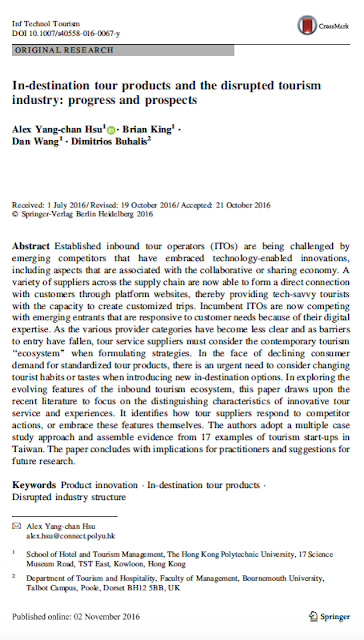ORIGINAL RESEARCH
Hsu, A., King, B., Wang, D., Buhalis, D., 2016, In-destination tour products and the disrupted tourism industry: progress and prospects, Information Technology & Tourism, Vol 17, pp.1-21.
https://doi.org/10.1007/s40558-016-0067-y and https://goo.gl/ntNBA1
Abstract
Established inbound tour operators (ITOs) are being challenged by emerging competitors that have embraced technology-enabled innovations, including aspects that are associated with the collaborative or sharing economy. A variety of suppliers across the supply chain are now able to form a direct connection with customers through platform websites, thereby providing tech-savvy tourists with the capacity to create customized trips. Incumbent ITOs are now competing with emerging entrants that are responsive to customer needs because of their digital expertise. As the various provider categories have become less clear and as barriers to entry have fallen, tour service suppliers must consider the contemporary tourism ‘‘ecosystem’’ when formulating strategies. In the face of declining consumer demand for standardized tour products, there is an urgent need to consider changing tourist habits or tastes when introducing new in-destination options. In exploring the evolving features of the inbound tourism ecosystem, this paper draws upon the recent literature to focus on the distinguishing characteristics of innovative tour service and experiences. It identifies how tour suppliers respond to competitor actions, or embrace these features themselves. The authors adopt a multiple case study approach and assemble evidence from 17 examples of tourism start-ups in Taiwan. The paper concludes with implications for practitioners and suggestions for future research.
Keywords: Disruption, technology, Product innovation, In-destination tour products, Disrupted industry structure
Introduction
Periods of tourism industry development have often coincided with technological advances which have challenged the position and roles of established stakeholders (Hjalager 2015). The progression of information communication technology (ICT) has been notable for facilitating a process of travel agency disintermediation (Buhalis and Licata 2002). The emergence of online travel agents (OTAs), combined with smart gadgets, mobile commerce, location-based services, data analytics, and the sharing economy have empowered tourists to co-create their journey experience with destination-based suppliers of tour components. Moreover, through the processes of globalization, international companies have offered greater freedom for citizens to engage in exploration beyond existing boundaries (Amadeus 2015). While some tourists may still prefer the convenience of group tours in a one-stop purchase, others expect more interactive and customized services (Dwyer et al. 2009). Moreover, the demand for technology-enabled travel experiences is increasing (Neuhofer et al. 2015) in this emerging smart tourism ecosystem (Gretzel et al. 2015). In the case of Taiwan, most visitors prefer to travel as free and independent travellers (FITs) and demand for group tours is falling (Taiwan Tourism Bureau 2015). It is becoming imperative for destination-based service providers to renovate their product range with a view to meeting changing needs within the FIT market, notably in the case of inbound tour operators (ITOs). While digital innovation has revolutionized many industries, Dawson et al. (2016) investigated the vulnerability of businesses through the major digital impacts on demand and supply, involving both incremental and radical changes. While technology is providing solutions to the customization of individual needs, modest adjustments are happening when market demand is fulfilled by creative suppliers who manage their costs more efficiently through the use of digitalization and external resources. Structural shifts are also occurring with the creation of ‘‘new value propositions, business systems, and hyperscaling platforms (Dawson et al. 2016, p. 1)’’ through technology-enabled innovations. Traditional ITOs are relatively vulnerable because the value that the sector creates is heavily dependent on information asymmetry and product bundling. Tourism stakeholders are being increasingly confronted by the disruptive power of the so-called collaborative or sharing economy (henceforth the sharing economy) (Euromonitor International 2014; Fraiberger and Sundararajan 2015). The advent of the sharing economy has been realized through novel platforms which address tourist needs by linking peerto-peer resources (Fraiberger and Sundararajan 2015). Driven by platform-based initiatives such as Airbnb and OTAs that include Expedia, the platform business model connects tourists directly with suppliers in the destination (Alstyne 2016).
Visitors are provided with alternative options to customize their journeys, thereby creating an opportunity for ITOs and tour service providers to offer individual components through the liberalization of distribution channels via global platform enterprises (Accenture Digital 2016). Nevertheless, while incumbent tourism stakeholders have traditionally designed their conventional tour products around the economic logic of providing multi-layered channels (Stamboulis and Skayannis A. Y. Hsu et al. 2003), they must now identify the emerging product features within the contemporary ‘‘smart’’ tourism ecosystem. Drawing upon the existing literature and on real-life examples, the authors of the present paper aim to explore how in-destination tour providers innovate their product offerings. In particular, while touring services are often non-standardized, the authors argue that identifying such features would benefit tourism stakeholders in light of the emerging platform-based business model such as the sharing economy. There is an evident need for the innovative in-destination tour suppliers to supplement the platform enterprises and to provide tourists with better solutions. If there is no innovation of in-destination services and products, it is likely that established tour suppliers will progressively cede their market position in the face of a digitally disrupted industry and shrinking demand for more conventional tour products.
